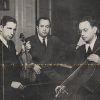Copland: Vitebsk (1928)
In the late 1920s, American composer Aaron Copland attended a performance of S. Ansky’s play The Dybbuk, a story of fated love and demonic possession. The play featured incidental music by composer Joel Engel, based on a Hassidic melody traced to Vitebsk, which Engel had discovered during a Jewish Ethnographic Expedition. This melody, later known as Mipnei ma, would inspire Copland’s 1928 composition Vitebsk for piano trio.
Copland sought to capture the harshness and drama of Jewish life in Russia. The piece is sharp, dissonant, and with quartertones, reflects the play’s dark themes of demonic possession and broken promises. It contrasts the rich, interconnected world of Jewish folk and religious beliefs with the harsh realities of life in a cosmopolitan city like Vitebsk. Musically, Vitebsk features a structure of slow outer sections and a fast middle section that incorporates jazz elements and klezmer-inspired rhythms. Although this was Copland’s only overtly Jewish composition, he noted that Jewish influences were always present in his music, reflecting his Eastern European heritage.
